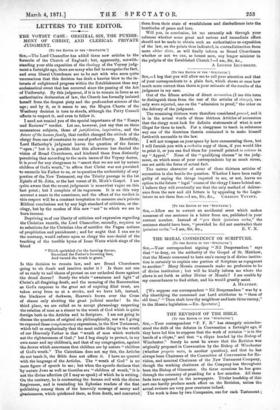LETTERS TO THE EDITOR.
HE VOYSEY CASE: ORIGINAL SIN, THE PUNISH- MENT OF CHRIST, AND CLERICAL PRIVATE JUDGMENT.
(ro THE EDITOR OF THE "SPECTATOR.") Sia,—The Lord Chancellor has added three new articles to the Tormulm of the Church of England ; but, apparently, notwith- standing your able exposition of the theology of the Voysey judg- ment a fortnight ago, there are many who fail to recognize the fact, and even liberal Churchmen are to be met with who seem quite -unconscious that this decision has dealt a heavier blow to the in- terests of enlightened progress within the Establishment than any ecclesiastical event that has occurred since the passing of the Act of Uniformity. By this judgment, if it is to remain in force as an authoritative declaration of law, the Church has formally isolated herself from the deepest piety and the profoundest science of the age ; and by it, as it seems to me, the Magna Charta of the Westbury decision is torn to shreds, although the Privy Council -affects to respect it, and even to follow it.
• I need not remind you of the special importance of the "Essays and Reviews" verdict. Let me, however, just say that on three 'momentous subjects, those of justifiLtion, inspiration, and the future of the human family, that verdict changed the attitude of the -clergy from one of constraint to one of perfect liberty. Mercifully, Lord Hatherley's judgment leaves the question of the future " open ; " but it is possible that this allowance has dazzled the vision of Broad Churchmen, and hindered them from distinctly perceiving that according to the main issues of the Voysey decree, 'it is penal for any clergyman to "assert that we are not by nature children of God's wrath," to affirm that Christ was not punished to reconcile his Father to us, or to question the authenticity of any portion of the New Testemeut, say the Trinity passage in the 1st Epistle of St. John, or the last verses of St. Mark's Gospel. I am quite aware that the recent judgement is somewhat vague on this last point ; but I complain of its vagueness. It is on this very
account a snare to the conscience, and• the effect of the verdict in -this respect will be a constant temptation to measure one's private Biblical conclusions not by any high standard of criticism, or the- -ology, but by the meshes of this new " net " to which we are to burn incense.
Depriving us of our liberty of criticism and expression regarding the Christian records, the Lord Chancellor, secondly, requires us to substitute for the Christian idea of sacrifice the Pagan notions 'of propitiation and punishment ; and for aught that I can see to -the contrary, would enforce upon us clergy the non-denial of the 'teaching of the terrible hymn of Isaac Watts which sings of the Wood
"Which sprinkled o'er the burning throne, Smoothed the Father's frowning face, And turned the wrath to grace."
Is this decision to remain law, and are Broad Churchmen -going to sit dumb and inactive under it ? Is there not one of us ready to nail theses of protest on our cathedral doors against the dread decree? Surely the whole "sweetness and light" of 'Christ's all-forgiving death, and the meaning of the Resurrection as God's response to the great act of expiring filial trust, are taken away from us at a stroke, and we have left, instead, =the blackness of darkness, Heaven's frown over the Cross of shame only abetting the great judicial murder ! In the -third place, we are called on to accept phraseology respecting the relation of man as a sinner to the wrath of God which is quite ;foreign both to the Articles and to Scripture. I am not going to discuss the question of original sin philosophically, nor am I going to expound those complementary expressions, in the New Testament, which tell us emphatically that the most unlike thing to the wrath of our Heavenly Father is that "wrath of man which worketh not the righteousness of God ;" but I beg simply to protest, in my own name and my children's, and that of my congregation, against 'the decree which announces that children are by nature "children of God's wrath." The Catechism does not say this, the Articles -do not teach it, the Bible does not affirm it. I have no quarrel -with the language of the Articles. The "wrath of God" is no mere figure of speech to me ; but when the apostle declares that 'by nature Jews as well as Gentiles are "children of wrath," it is not the divine affection (if I may so speak) of which he is writing. On the contrary, he is contrasting the human evil with the divine forgiveness, and is reminding his Ephesian readers of the first publishing among them of the heavenly message of mercy and graciousness, which quickened them, as from death, and converted
them from their state of wrathfulnees and disobedience into the beatitudes of peace and love.
Will you, in conclusion, let me earnestly ask through your columns whether some great and serious and immediate effort should not be made to obtain such an authoritative re-exposition of the law, on the points thus indicated, in contradistinction from mere obiter dicta, as will finally inform us Broad Churchmen whether or not we can, as honest men, any longer minister in the pulpits of the Established Church ?—I am, Sir, &c.,
A LoNnox Irrcuanizirr.


































 Previous page
Previous page